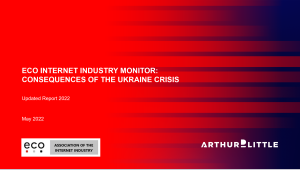In spite of the risk of an economic recession, the digital industry remains on course for growth
eco Chair of the Board Oliver Süme: “The Internet industry is a reliable partner in the crisis. Politics must contribute to reducing uncertainties in the market.”
- Inflation intensified by Ukraine crisis exerting inflationary pressure on the Internet industry. This leads to short-term revenue growth – followed by medium-term adjustment
- Industry segment with highest growth rate: Services & Applications sector profits from mounting cybersecurity requirements
Russia’s war against Ukraine is a humanitarian and geopolitical catastrophe with a serious impact on the economy. The Internet Industry Monitor conducted by eco and Arthur D. Little sheds light on the likely effects of the Russian war of aggression on the Internet industry in Germany. The focus is on general macroeconomic trends as well as specific developments in the various sectors of the Internet industry. Apart from continued inflation and self-imposed restrictions in the industry as a result of the Russian war of aggression on Ukraine, the impact on the German Internet industry is quite limited compared to other industries. The growth which the analysts have forecast to take place for the Internet industry up to 2025 therefore remains essentially stable, with the analysts projecting an average growth of 12.2 per cent per year.
“It goes without saying that the ongoing inflation and the tense situation on the financial, commodity and energy markets are not leaving our industry unscathed”, says eco Chair of the Board Oliver Süme. In particular, rising interest rates as well as energy and production costs are putting increasing pressure on the Internet industry and could lead to slumping margins in some fields. “Nevertheless, we continue to see growth trends in all segments, which show that digitalisation is not a short-term trend, but that we must continue to invest in the sustainable digital transformation of the economy and society”, says Süme.
“In times of crisis, the Internet industry still remains a strong motor for Germany as a business location and a reliable partner for user industries, politics and users themselves.” At present, however, uncertainty is very high among companies and customers alike, Süme goes on to say. “Policymakers must focus on activities that help reduce uncertainty and thus support investments and business development”, is Oliver Süme’s call for action. For instance, there is an imperative need for a quick and reliable formation of the transatlantic data protection agreement, as well as measures to strengthen digital sovereignty and energy independence.
Price pressure from inflation leads to short-term revenue growth – followed by medium-term realignment
“Across the entire Internet industry, short-term increases in revenue can be observed in all four segments, due to inflation-related price increases and a trend towards localising and securing local infrastructure, services and consumption”, says Lars Riegel, Partner at the management consultancy Arthur D. Little (ADL). The management consultancy therefore expects an average annual growth of 12.2 per cent to take place for the German Internet industry up until 2025, which would mean the revenue level will have increased to 258 billion Euro. “In the medium term, however, there is a risk of an economic slowdown and consumers trying to cut back on spending on services that are not urgently needed”, adds Riegel.
Services & Applications sector profits from mounting cybersecurity requirements
The Services & Applications sector in particular profits from the increased readiness of its customers to invest in cybersecurity, which is presumably due to the mounting requirements and the increase in cyberattacks on western targets. The eco IT Security Survey 2022 shows that 94 per cent of TMT companies believe that the risk of IT threats has increased this year (in comparison with 77 per cent of companies in 2021), while 71 per cent believe that existing cybersecurity systems are inadequate (compared to 57 per cent in 2021).
As a result, the highest growth rates are also expected in this industry segment in the medium term. The eco Internet Industry Monitor expects an average growth of 18.4 per cent to take place per year until 2025.
A major cyber war that would target German companies on a massive scale and lead to a drop in revenue is unlikely. However, insecurity and risks remain high and should be prevented in the future by secure and more robust IT systems and infrastructures.
“Secure digital infrastructure is essential, especially in the current crisis situation”, says Prof. Norbert Pohlmann, eco Board Member for IT Security. It is therefore not surprising that the usage parameters continue to be on an upward trend.
Download the eco Internet Industry Monitor Update: Consequences of the Ukraine Crisis



